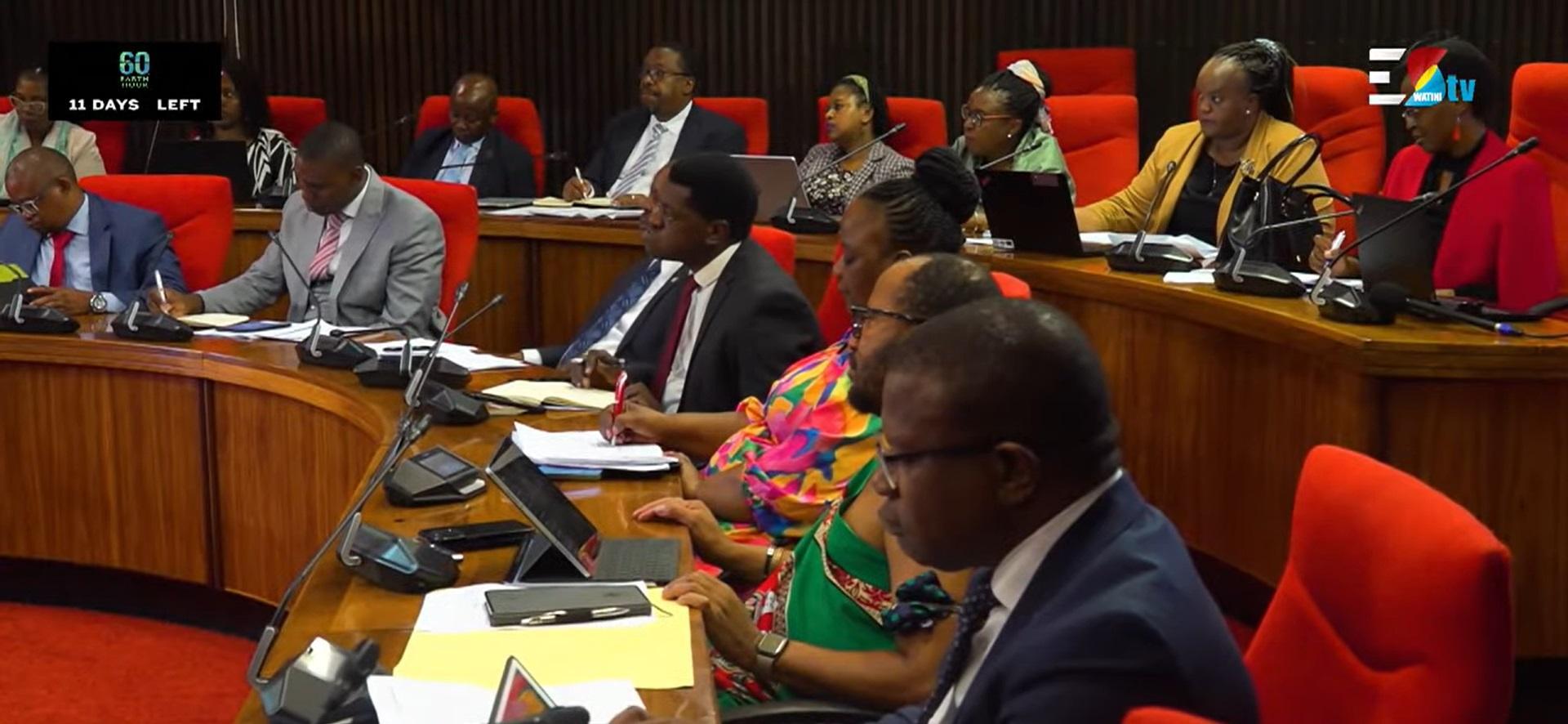Africa-Press – Eswatini. The Members of Parliament (MPs) who suggested that government must bail out Ecsponent are a shame to themselves. They have done total disservice to their own constituencies.
If the power of recall was included in the Constitution of the Kingdom of Swaziland (Eswatini), I would be calling for its invocation. These MPs wanted the taxpayer to settle E335 million on behalf of an investment scheme that failed to honour its obligation to pay its members.
There have been more than two failed schemes in the country that were not bailed out by government. What is so special or unique about Ecsponent? On November 16, 2013, there was a meeting at the University of Eswatini (UNESWA), where it was reported that local companies, co-operative societies and individuals invested their pensions and terminal benefits worth over E23 million with a collapsing South African real estate investment scheme called Sharemax. In total, 34 000 investors, including emaSwati and South Africans, lost half of the E4.4 billion they invested in Sharemax schemes.
There were emaSwati who invested between E200 000 and E300 000 each. They invested their terminal benefits and pensions after being retrenched by their various companies.
Sharemax Investments (Pty) Limited was a real estate property investment company that specialised in renting, operating and managing commercial properties for shops and offices.
The company was incorporated in 1998 and was based in Pretoria, South Africa. As of October 4, 2011, Sharemax Investments (Pty) Ltd. operated as a subsidiary of Realcor Holdings (Pty) Ltd. People invested in these assets and were promised good returns. One woman, Zandile Dlamini, wept when she narrated how her relative lost over E100 000 in the scheme. A local co-operative society is said to have invested E4 million.
Victims of the Sharemax investment scheme included Hlalawati Co-operative, Swaziland Union of Financial Institutions and Allied Workers (SUFIAW). Others are the Swaziland Investment Consortium and a certain scheme for employees of the Swaziland Posts and Telecommunications Corporation (SPTC). The Financial Services Regulatory Authority (FSRA) and Central Bank of Eswatini (CBE) told investors at the meeting held at the UNESWA that Sharemax Eswatini was not registered in in the country. This revelation left 200 investors who attended the meeting perplexed; after all, they had been promised that their investments would mature in five years. Interests varied from 9 to 12 per cent per annum and could increase when there was boom in the market.
Lucrative
Sharemax, as real estate investment that had set up malls and other commercial buildings, urged emaSwati to invest in property because of its lucrative market. EmaSwati must never forget that the contract the investors entered into with Sharemax through Sambulo Investment was written in Afrikaans, a language they did not understand. Sambulo Investment was an insurance broker which was suspended for its involvement with the failed investment scheme. Sandile Dlamini, the then Chief Executive Officer (CEO) of the FSRA, said they had no locus standi (legal authority) to pursue the matter in the courts of South Africa. He advised the investors to seek the services of an attorney who could take up the matter with the South African Ombudsman and Reserve Bank.
Dlamini said there were views that government should release its attorney to represent them. The CEO advised them to write a letter to the Office of the prime minister or Ministry of Justice and Constitutional Affairs and request for the services of a government attorney. Dlamini said they told him that they did not have money to hire the services of a private attorney; hence government should come to their rescue. Many a times Ponzi schemes collapsed in Eswatini, leaving desperate investors suffering from stroke. As taxpayers, we cannot allow proprietors of these schemes to get it with it. We cannot bail them out. Just as emaSwati painful as it is we need to learn from such failed schemes, if it is too good to be true, it usually is.
Neal Rijkenberg, the Minister for Finance and Attorney General Sifiso Khumalo are correct that the MPs cannot force government into bailing out Ecsponent. The people who are responsible for this failed investment should be prosecuted.
It is a pity that the advice that government should pay the investors comes after some MPs had gone to South Africa to interview Dave van Niekerk, one of the people who was directly or indirectly involved in the management and supervision of this heartbreaking investment scheme. In terms of the country’s Constitution, parliamentary committees, during their course of investigations, assume powers of justices of the High Court.
I, therefore, recognise the House of Assembly’s Select Committee report suggesting that George Manyere, Dave van Niekerk and FSRA should pay the principal amount of the investments that were made through Ecsponent. Van Niekerk was also accused of allegedly controlling the CBE. The CBE must state in public what the investigators discovered which made them to agree in one accord that Van Niekerk controls this very important national bank.
Loss of millions
The Parliament Select Committee was appointed by the House of Assembly to scrutinise and analyse the Cliffe Dekker Hofmeyr (CDH) INC Forensic Report on the loss of millions of Emalangeni through Ecsponent investment scheme. The report was tabled by the Chairperson of the committee, Deputy Speaker Madala Mhlanga, on Monday, in Parliament.
The committee was selected a month ago, after the Minister for Finance, Rijkenberg tabled a forensic report on what transpired in Ecsponent, which later became known as Eswatini Investment Group (ESWIG), which led to over E335 million principal investments belonging to emaSwati disappearing. In the tabled report, the committee met with over 15 stakeholders, including South African national, Van Niekerk, George Manyere, who is a former Ecsponent CEO and the FSRA, which licensed Ecsponent and other investment entities that are linked to the losses.
The select committee has presented two options that the Ecsponent investors should explore to recover the lost funds. It highlighted that due to the complexity of the transactions and company structures, it may be challenging to establish a direct claim against Manyere and Tim Nuy, finclusion and the MHMK Group, which was founded by Manyere. According to the committee’s recommendations, the investors could only recoup their principal investments, not the interests of the investments. As much as the recovery of the monies is necessary, it is time we see arrests of everyone who is linked to the failed investment.The warrants of arrests issued against certain individuals must be executed as soon as possible. We have to send a message as a country to would-be offenders that Eswatini is not a playground.
Let me now give advice to emaSwati. In an increasingly complex financial landscape, where opportunities for investments are vast and varied, the allure of high returns can sometimes obscure the inherent risks involved. While some schemes promise rapid wealth accumulation, history bears testament to the dangers of entering such ventures without due diligence.
Across the globe, various high-profile investment schemes have collapsed, taking with them billions of Dollars and, more importantly, the financial hopes and dreams of countless individuals. The infamous case of Bernard Madoff in the United States underscores this peril. Madoff’s Ponzi scheme, which defrauded investors of approximately US$65 billion (E1.2 trillion), culminated in one of the largest fraud scandals in history, resulting in Madoff’s arrest and a 150-year prison sentence. Similarly, in Canada, the case of the fraudulent investment firm, First Leaside Group, exposed hundreds to severe financial loss. These schemes unravelled due to the unsustainable nature of their promises, ultimately leading to the incarceration of their orchestrators.
Regrettably, a similar narrative has unfolded within the Kingdom of Eswatini, where an investment scheme has recently collapsed, causing enormous financial losses to emaSwati and sowing seeds of distrust within the community. In light of these events, it is imperative for emaSwati to exercise prudence and vigilance when considering investment opportunities.
Before embarking on any investment endeavour, consider the following prudent steps:
As the financial terrain continues to evolve, staying informed and cautious is paramount. While the promise of wealth is captivating, protecting one’s financial wellbeing requires thoughtful scrutiny and strategic decision-making. In conclusion, by adhering to these principles, emaSwati can safeguard themselves against the pitfalls of ill-conceived investment endeavours and ensure their financial stability for the future.
Source: times
For More News And Analysis About Eswatini Follow Africa-Press







